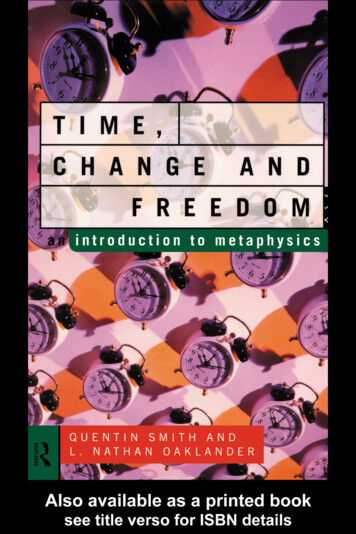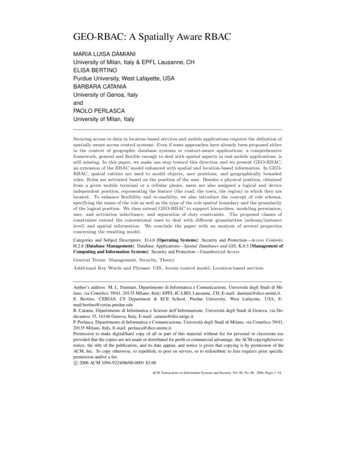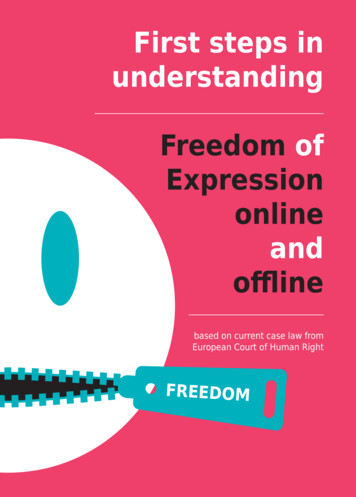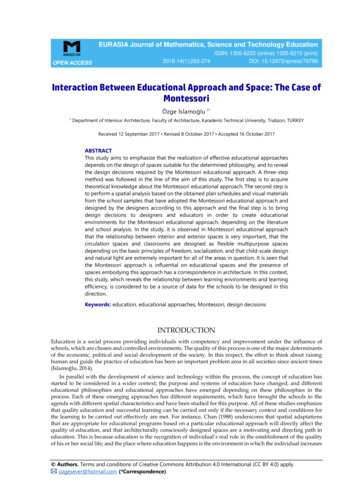
Transcription
Time, change and freedomThis is no ordinary introduction to metaphysics. Written for the mostpart in an engaging dialogue style, it covers metaphysical topics from astudent’s perspective and introduces key concepts through a process ofexplanation, reformulation and critique.Focusing on the philosophy of time, the dialogues cover such topics asthe beginning and end of time, the nature of change and personalidentity, and the relation of human freedom to theories of fatalism,divine foreknowledge and determinism. Each dialogue closes with aglossary of key terms and suggestions for further reading.Time, Change and Freedom concludes with a discussion of themetaphysical implications of Einstein’s theory of relativity and a reviewof contemporary theories of time and the universe.Written throughout in an accessible, non-technical style, Time, Changeand Freedom is an ideal introduction to the key themes of contemporarymetaphysics. It will be invaluable for all students on introductoryphilosophy courses as well as for those interested in metaphysics and thephilosophy of time.Quentin Smith is Professor of Philosophy at Western MichiganUniversity. L.Nathan Oaklander is Professor of Philosophy at theUniversity of Michigan-Flint.
Time, change and freedomAn introduction to metaphysicsQuentin Smithand L.Nathan OaklanderLondon and New York
To the memory of Jacinto R.Galang, JacintoA.Galang and Romy Galang; and to Janet andHoward Smith, necessary conditions of the possibilityof Part I and the Appendix.First published 1995by Routledge11 New Fetter Lane, London EC4P 4EESimultaneously published in the USA and Canadaby Routledge29 West 35th Street, New York, NY 10001Routledge is an imprint of the Taylor & Francis GroupThis edition published in the Taylor & Francis e-Library, 2005.“To purchase your own copy of this or any of Taylor & Francis or Routledge’scollection of thousands of eBooks please go to www.eBookstore.tandf.co.uk.” 1995 Quentin Smith and L.Nathan OaklanderAll rights reserved. No part of this book may be reprinted orreproduced or utilized in any form or by any electronic,mechanical, or other means, now known or hereafterinvented, including photocopying and recording, or in anyinformation storage or retrieval system, without permission inwriting from the publishers.British Library Cataloguing in Publication DataA catalogue record for this book is available from the British Library.Library of Congress Cataloging in Publication DataSmith, Quentin, 1952–Time, change and freedom: an introduction to metaphysics/QuentinSmith and L.Nathan Oaklander.p. cm.Includes bibliographical references and index.1. Metaphysics. 2. Time. 3. Change. I. Oaklander, L.Nathan,1945– . II. Title.BD111.S575 1994110– dc20 94–34474CIPISBN 0-203-98066-2 Master e-book ISBNISBN 0-415-10248-0 (hbk)ISBN 0-415-10249-9 (pbk)
iv
ContentsIntroduction by Quentin SmithPart IviiThe finite and the infiniteQuentin SmithDialogue 1The beginning of timeDialogue 2The infinity of past and future time14Dialogue 3The relational and substantival theories of time30Dialogue 4Eternity40Part II2Time and identityL.Nathan OaklanderDialogue 5The problem of change51Dialogue 6The passage of time60Dialogue 7Personal identity91Dialogue 8Personal identity and timePart IIIDialogue 9108The nature of freedomL.Nathan OaklanderFatalism and tenseless time119Dialogue 10God, time and freedom133Dialogue 11Freedom, determinism and responsibility148AppendixPhysical time and the universeQuentin Smith163Section APhysical time in Einstein’s Special Theory ofRelativity165Section BPhysical time in current cosmologies183Index210
vi
IntroductionQuentin SmithThe word “metaphysics” has become a part of popular culture andalmost everybody thinks they know what “metaphysics” means. This isunfortunate for philosophers, for the popular meaning of “metaphysics”is very different from the philosophical meaning. Popular metaphysicsdeals with such topics as “out-of-the-body experiences,” levitation,astral projections, telepathy, clairvoyance, reincarnation, spirit worlds,astrology, crystal healing, communion with the dead and other suchtopics. Popular metaphysics consists of notions that for the most partare inconsistent with science or reason. Private and unverifiableexperiences, fanciful speculations, hallucinations, ignorance of scienceand the misuse of logical principles are typical of the ingredients foundin popular metaphysics. Given the difficulty and the enormous time andeffort it requires to think in a logically systematic way and tounderstand current science, it is not surprising that more people areattracted to popular metaphysics than to philosophical metaphysics.Philosophical metaphysics, the subject of this book, is at the far endof the spectrum from popular metaphysics. Philosophical metaphysics isboth consistent with, and in part based upon, current scientific theory,and it uses logical argumentation to arrive at its results. For example, ifcurrent science informs us that the universe began to exist 15 billionyears ago with an explosion called “the big bang,” then metaphysicswill take this theory into account in formulating theories about thebeginning of time and the universe. Moreover, philosophical metaphysicstakes logical consistency as a necessary condition of truth. In popularmetaphysics, one can say “I don’t care if there is a logical disproof of mytheory; I still believe my theory because I feel in my heart that it is true.”But one cannot get away with this in philosophical metaphysics; if one’stheory has been shown to be logically self-contradictory, then oneabandons the theory.Philosophical metaphysics aims to answer two sorts of questions: (1)What is the basic nature of reality and what are the basic kinds of itemsthat make up reality? (2) Why does the universe exist?
viiiThe question about the basic nature of reality has usually been called“ontology,” after the Greek word ontos (beings). Ontology is the studyof beings, the study of What Is. The question about why the universeexists has for centuries been regulated to a second area of metaphysics,“philosophical theology,” after the Greek work theos for divinity. In thepresent book on Time, Change and Freedom we shall deal withontology. In another volume, Theism, Atheism and Big BangCosmology, by W.L.Craig and Q.Smith,1 philosophical theology isaddressed, the study of why the universe exists and whether or not thereare reasons to believe there is a divinity. In this second volume, I haveshown that there can be an answer to the metaphysical question, “Whydoes the universe exist?” that does not appeal to any divinity, but tocertain laws of nature, such as the laws of nature that Stephen Hawkinghas discussed in his book, A Brief History of Time.2 Since the questionof why the universe exists has been for centuries associated with thequestion of whether God exists, it has come to seem natural to associatethe words “philosophical theology” with this branch of metaphysics. Amore neutral title of this branch might be “explanative metaphysics,”the branch of metaphysics that attempts to determine if there is anexplanation of why the universe exists.The present volume is on ontology. What are the general features ofreality, what sorts of beings make up reality and how are the varioussorts of beings related to each other? From the very beginning, time hasplayed a central role in ontological studies. Perhaps the earliestinfluential metaphysical theory was Plato’s. Plato divided reality intotwo sorts, depending on how it stood in relation to time. For Plato, truebeing or full being belongs to the everlasting, the permanent, whereasimperfect being, the impermanent, belongs to the realm of what comesto be and passes away in time. This reliance on time to divide basiccategories of being became even more prominent in medievalmetaphysics, where concepts related to time, specifically eternity, wereunderstood as the paradigm of being itself. “To be” in the full andperfect sense is to be eternal, and anything else “is” at all only to theextent that it imitates the eternal mode of being. With modern thinking,we find less emphasis on eternity, but more emphasis on time as thecentral feature of reality. We find Kant saying that time is thefundamental way in which the mind understands reality, and intwentieth-century existential theory we find Heidegger saying that timeis the meaning of Being itself.Time plays an equally fundamental role in twentieth-century analyticmetaphysics, which is the metaphysical tradition to which the presentbook belongs. We shall take tune as the key to our entry intometaphysics and as the unifying theme of our discussions of the varioussorts of beings. The understanding of the nature of substances, events,
ixpersons, changes, eternity, divine foreknowledge, fatalism, the universe,all require that we understand how these kinds of items arecharacterized in terms of their temporal characteristics or their relationto time. If we want to understand the universe, we want to know if timebegan to exist or whether the past is infinite. If the universe began toexist, can there be empty time that elapsed before the universe came intoexistence? Questions about everyday objects also involve temporalnotions. The understanding of things, events, changes, personal identity,free will and the like also requires an understanding of their relation totime. For example, a substance (such as a table) is a thing that enduresthrough successive times, whereas an event is often understood as asubstance possessing a property at a certain time. A change is asubstance having one property at one time and losing that property at alater time. Metaphysical issues about freedom also involve time; forexample, the question about whether we have free will and about whetherwe are “fated” to live our future lives in a certain way depends on howpresent time is related to future time. Indeed, the very questions, “Whatis reality?” or “What is being?” cannot be answered without bringing inthe notion of time. For example, does reality consist only of the fleetingpresent, what is occurring now? Or is reality extended into the futureand the past, such that the future and the past are equally as real as anytime we choose to call “the present”? Furthermore, does reality divideinto two realms, the eternal and the temporal, or does reality consistonly of time and its occupants?These and other metaphysical questions are addressed in the three partsof this book and the Appendix.Part I has the title “The finite and the infinite” and deals with issuespertaining to the finitude or infinitude of time. Dialogue 1 discusses thebeginning of time; Dialogue 2, infinite past and future time, andDialogue 3, the question of whether time consists merely of the events inthe universe or is an independent “substantial” reality that wouldcontinue to “flow on” even if there were no events. In Dialogue 4, weshall consider several definitions of divine eternity and discuss whetheror not it is possible for there to be an eternal being.In Part II, “Time and identity,” we shall turn to issues of change,temporal passage and personal identity. Things persist and retain theiridentity through time and change. But what is identity through tune?What is change? These questions are addressed in Dialogue 5.Dialogue 6 on the passage of time addresses the issue of whether ThePresent is the sole reality or whether all times (be they 500BC, 1994 or1999) are equally real. Dialogues 7 and 8 are about the nature ofpersonal identity and how personal identity is related to time.In Part III, “The nature of freedom,” three issues about freedom arediscussed. In Dialogue 9, there is a discussion of whether or not we are
xfated to live our future lives in a certain way. Dialogue 10 considers if itis possible for us to make free choices if God exists and foreknows everychoice we will make. In Dialogue 11, there is a discussion of whether ornot all our decisions are caused by past events and, if so, whether that iscompatible with our decisions being “free” in some sense.The Appendix, “Physical time and the universe,” addresses topics thatare closely related to current scientific theories, especially Einstein’sTheory of Relativity and current cosmological theories. Physics, andespecially physical cosmology, has developed extensive theories abouttime and the universe that are confirmed by the observational evidence.The task of the metaphysician is to interpret the significance of thephysicist’s equations for an understanding of time and the universe.Many of the most unusual, or possible, features of the universe areoriginally based on physical theories rather than purely philosophicaltheories. We shall analyze the meaning of the scientific theories of timetravel into the past, of splitting universes, theories that our universeoccupies a time series that branches off from a background “trunktime,” that time could be closed like a circle, that what is real andpresent is relative to one’s reference frame, and related topics.What will the reader learn from this book on metaphysics? The readerwill not learn something in the same sense that she might in reading atextbook on chemistry or biology. There is no established body ofknowledge in metaphysics. On virtually every subject, there iswidespread disagreement among metaphysicians. One reason for thisdifference between science and metaphysics is that scientific theorieslead to predictions of observations that can be used to settle disputes.For example, if one theory predicts that the earth revolves around thesun, and another theory predicts that the sun revolves around the earth,then there is a way to resolve the dispute, for example, by observing thesun and earth from the vantage point of a rocket in outer space.However, the subjects that are studied in metaphysics do not lead topredictions of observations and consequently, disputants in this fieldmust rely on logical argument from premises and try to demonstratelogical fallacies in the argument of their opponent. The opponenttypically responds by arguing that some of the premises are false, or byclaiming that the conclusion does not follow from the premises, or byrevising his own theory to render it immune to the argument. Thisprocess of argument and counterargument tends to go on indefinitely;consequently, progress in metaphysics is measured not by definitiveresults but by the increasing sophistication of the theories that defendersof opposing positions develop.But this is not to say that there are no right answers in metaphysics.There are right answers, but the issues are so complex and difficult toresolve that it is extremely hard for us humans— fallible products of
xievolution that we are—to arrive at definitive and universally acceptedanswers to the questions. Perhaps the problem is that the human speciesis intelligent enough to ask metaphysical questions and to developarguments for certain metaphysical positions, but not intelligent enoughto provide definitive answers to these questions. Some may concludefrom this that we should concentrate on questions that are easier toanswer, such as scientific questions, but this conclusion is unworkable.It is unworkable because we cannot help but adopt and live by variousmetaphysical beliefs. For example, we must live as if there is an eternalGod or as if all that exists is matter and organisms that exist in time.And we must live as if we have free will or as if we are “fated” to doeverything we do. Metaphysics deals with the rock-bottom issues thatno one can escape, unless they live their lives in a coma. The only choiceis to adopt a sophisticated and well thought out metaphysical theory orto accept glib and simpleminded answers to the questions. The point ofthis book is to stimulate the reader to develop a well thought outmetaphysical theory on the various metaphysical topics discussed in thisbook. What will be learned from this book is not a body of truths butrather a set of arguments and counterarguments for variousmetaphysical positions. For example, the reader will learn some of themain arguments for the thesis that we have free will and some of themain arguments that we do not have free will. We hope that the readerwill assess these arguments and counterarguments on her own and try tomake up her own mind on each of the issues.The disputational nature of metaphysics explains why we haveadopted a dialogue form for Parts I to III of this book. A dialoguepresents metaphysics in its true nature, as a sustained debate betweenopposing philosophers on each of the various metaphysical topics. Topresent arguments for only one side of the issue, as do manymetaphysical books, creates an impression of bias and disguises the trulycontroversial nature of the subjects.However, we do not use the dialogue form in the Appendix. TheAppendix explains, interprets and draws conclusions from Einstein’sTheory of Relativity and current physical cosmology. As we draw closerto the sciences, there is less room for debate and disagreement. There iswidespread agreement about the fundamentals of Einstein’s theory andhence a dialogue or debate form would be inappropriate for explaininghis theory. There may be some disagreement about how to interpretEinstein’s theories, but these disagreements are not so pervasive andintractable that a dialogue and debate format is required. Thus, theAppendix is an expository essay that lays out the fundamentals ofEinstein’s theory and contemporary physical cosmology and discussesthe metaphysical implications of these ideas.
xiiThis book aims to present original theories we have developed andyet at the same time be accessible to beginners in the field. The newtheories advanced will make it of interest to philosophy professors andgraduate students, and its accessibility to beginners will make it suitablefor use by the general public and in undergraduate courses onmetaphysics, philosophy of science and the introduction to philosophy.In an effort to make the book as accessible as possible, we have placed aglossary, study questions and suggestions for further reading at the endof each dialogue and at the end of the Appendix. We have provided thediving board, but once the reader takes the dive into the abyss ofmetaphysical complexities, the reader’s own reasoning powers will be theonly guide. The rational struggle for metaphysical truth is a struggleunto death and perhaps the one absolutely certain metaphysical thesis isthat death—after allowing us to skirmish for a brief while—willproclaim its silent victory. But the time is not yet, so let us enter theskirmish.NOTES1 W.L.Craig and Q.Smith (1993) Theism, Atheism and Big Bang Cosmology,Oxford: Oxford University Press.2 Stephen Hawking (1988) A Brief History of Time, New York: BantamBooks.
Part IThe finite and the infiniteQuentin Smith
Dialogue 1The beginning of timeALICE:PHIL:SOPHIA:IVAN:A philosophy majorA philosophy majorA philosophy professorA philosophy professorOutside of the Lonesome Hut cabin, near the top of Mount Washingtonin the White Mountains in New Hampshire. Alice, Phil, Sophia and Ivansit on a promontory, watching the stars emerge as dusk deepens. After along silence, Alice begins to speak.ALICE: Do you think that the universe was always here, that timestretches back earlier and earlier into the past, without anybeginning at all? Or did everything have a beginning? Did timebegin?PHIL:Time begin? How could time begin? Everything that begins,begins in time, so time itself cannot begin.ALICE: Explain that. Why cannot time begin?PHIL:If something begins, that means there was an earlier time atwhich the thing did not exist and a later time at which thething exists. So if time itself began, that would imply therewas an earlier time at which time did not exist and a later timeat which time exists. In short, it implies there is a time earlierthan the earliest time. It is clear that is a contradiction. So pasttime must be without a beginning. It is infinite.SOPHIA: Let me interject here. I understand what you are saying, Phil,but there is a different way of viewing the matter. Time doesnot begin in the same way that things in time begin. Timebegins if there is a first moment, a moment before which thereare no other moments. There are two senses of “Somethingbegins.” In one sense it means “There was a time at whichsomething did not exist and a later time at which it does exist”and in another sense it means “Something is the earliest
THE BEGINNING OF TIME 3moment of time, so that all other moments are later than it.”Time “begins” in the second sense.PHIL:That is hard to conceive. Is there any reason to think that timedid begin?SOPHIA: Some scientists today believe that time did begin. They believethat time began about 15 billion years ago with the so-called“big bang,” an explosion of matter, energy and space out ofnothingness. At the first time, there existed only an extremelytiny but very dense speck of matter. This speck of matter wasso tiny it was much smaller even than an atom. This speck ofmatter instantaneously exploded in the powerful explosioncalled the big bang. As this matter exploded, the spacecontaining it began to expand, much like the surface of anexpanding balloon. This expansion is still going on today; theuniverse is growing larger in volume at every moment.IVAN: Sophia is right. The physicist Stephen Hawking says that timebegan with the beginning of the big bang explosion. He saysthat to ask what occurred before this explosion is like askingwhat is north of the North Pole. There is nothing that is northof the North Pole, and there is nothing that occurred before thebig bang.PHIL:I have some difficulty in understanding this idea, and am notquite sure I really can believe it, despite the fact that StephenHawking and some other scientists believe it is true. Suppose Iam somehow located at the moment of the big bang. I canthen conceive of a moment before this moment and if I can dothis, that seems to suggest there is an earlier moment.ALICE: I can see the fallacy in that argument. Surely you couldconceive of an earlier time, but that does not mean there wasan earlier time. In fact, your concept will not refer toanything, since there was no earlier moment for it to refer to.You are at the big bang, trying to think of an earlier time, butin fact there is in reality nothing corresponding to yourthoughts.PHIL:But I think your own remarks imply there must have been anearlier time. Consider the statement, there was nothing beforethe big bang. That implies that there was a time before the bigbang, a time at which there was nothing.IVAN: Let me give a precise and logical formulation of yourargument, Phil, and see what Sophia has to say about it. Idon’t agree with the argument myself, but I am interested tosee how Sophia responds to it. The argument goes like this.Either there was something occurring before the big bang or
4 THE FINITE AND THE INFINITEthere was nothing occurring before the big bang. In either case,there is an earlier time at which there either was something ornothing occurring. The contradiction also appears when wesay “There was no time before the big bang” for “there was”and “before” refer to the past time that preceded the big bang.SOPHIA: I think you are again confusing talk about time with talk aboutthings in time. “There was no time before the big bang” doesnot mean “At the time before the big bang, there was notime.” Suppose we are all located at the big bang. We couldthen take “There was no time before the big bang” to conveythat “It is now true that time Is and Will Be but it is now falsethat time Was.”IVAN: Sophia, let me elaborate on your point, which seems on theright track. If we are located at the big bang, then we shouldsay that the notion of “there was ” has no application at all.“There now is ” refers to something and “there will be ”refers to something, but “there was ” does not. Likewise, weshould say that the notion of “before the big bang” has noapplication at all; only the expressions “simultaneously withthe big bang” and “later than the big bang” have application.PHIL:That is clearer. I think I am beginning to see. Maybe yourpoint can be put metaphorically. If we are at the big bang andtry to turn our thoughts towards the past, we encounter aninvisible wall of nothingness. There is nothing at all there.IVAN: Sophia, let me go back to something you said earlier. Youstated that “Time begins” means “There is a first moment oftime.” I do not think that is a very good definition of “Timebegins,” since there is a sense in which time begins eventhough time lacks an earliest moment. Time began 15 billionyears ago, but for every moment of time, there is an earliermoment.SOPHIA: Explain exactly what you are getting at, Ivan.IVAN: Take the first hour of time. Is that the first time? No, sincethere is a shorter interval of time that elapses before the firsthour elapses. There are sixty minutes in an hour and the firstof these minutes must elapse before the whole hour canelapse. Moreover, before the first minute elapses, the firstsecond elapses, and before the first second, the first one-tenthof a second, and so on infinitely. Since there is no shortesttemporal interval, there is no interval of time that can beidentified as the first interval of time. For any interval of timethat elapses during the first hour, there is a shorter intervalthat elapses first. Thus, there is no “first moment of time” in
THE BEGINNING OF TIME 5the sense of an interval of time that precedes every otherinterval.SOPHIA: But if time begins, there is an earliest interval of time of eachlength. For example, there is a first second, a first hour, a firstyear and so on. That is what I meant by saying that “Timebegins” means “There is a first moment of time.”IVAN: But Sophia, even that is not quite right. It is right only if futuretime is endless. But it is wrong if time comes to an end.Suppose time begins, and ends 30 billion years later. If so,there is a first second and a first hour and a first year, butthere is no first interval of the length 40 billion years, since nointervals of this length exist. So in this case your statementthat “There is an earliest interval of time each length” wouldbe false.SOPHIA: I see your point, Ivan. What I should say, to be strictlyaccurate, is that “Time begins” means there is a first interval oftime of some length (but not necessarily of every length). Timebegins, for example, if there is a first second, even if there is nofirst interval of the length 40 billion years.IVAN: All right, I agree that is a good definition of “Time begins.”ALICE: I am not entirely sure about everything that you are bothagreeing upon, Ivan and Sophia. Ivan, you said that there is noearliest interval of time, since for every actual interval, there isa shorter interval that elapses first. This implies that there arean infinite number of shorter and shorter intervals. But whyshould we think that time is infinitely divisible? Why can’tthere be a shortest interval, say an interval that lasts for onemillionth of a second? If there were, then the first interval ofthat length would indeed be the first interval of time. Therewould be no interval of any length that elapsed before thatinterval elapsed.IVAN: The view that time has a shortest interval that is not furtherdivisible is the view that time is discrete. This means that thereis some shortest interval of time, say one-millionth of a second,and that there is no period of time shorter than this. Somephysicists think that quantum mechanics implies that there is ashortest interval, an interval that lasts for only 10–43 second.This is 1/100000 of a second, where there are forty-threezeros after the 1. This is an extremely short period of time, farshorter than one-trillionth of a second. But I think thatphysicists are best understood as saying that it is impossible toobserve any interval of time that is shorter than 10–43 second.
6 THE FINITE AND THE INFINITEI think it is a conceptual necessity that for any interval oftime, there must be a shorter interval.ALICE: I do not see why this is a “conceptual necessity,” as you callit.IVAN: It is a conceptual necessity since a temporal interval by its verynature contains successive parts. In order for any interval toelapse, the first half of the interval must elapse before thesecond half elapses. Thus, any interval must be composed oftwo shorter intervals. For each of these shorter intervals, thefirst half of the interval must elapse before the second half.This subdivision continues indefinitely, which shows there canbe no shortest interval.ALICE: Perhaps we can mentally divide up every interval, but whyshould it follow that reality must conform to our mentaldistinctions? Maybe we can mentally divide the interval of 10–43 second into two halves, but in reality this interval does nothave any parts.IVAN: A temporal interval by definition has successive parts.ALICE: Well, maybe your definitions do not correspond to reality.Maybe we should accept what the physicists say.SOPHIA: I would like to interrupt here. Both of you seem to think thatthe only alternatives are that time is ultimately composed ofintervals of some shortest length (Alice’s view) or that time iscomposed of intervals that are infinitely divisible (Ivan’sview). Actually, there is a third theory of time, which is basedon the distinction between instants and intervals. An intervalis any time that has duration, however short it may be. But aninstant is a time that has no duration at all. According to thethird theory of time, time is ultimately composed of instants.PHIL:Your distinction between instants and intervals soundsmysterious. Could you tell us more about instants?SOPHIA: An instant lasts for no time at all. It is shorter than one second,one-millionth of a second, one-trillionth of a second, and
metaphysics, which is the metaphysical tradition to which the present book belongs. We shall take tune as the key to our entry into metaphysics and as the unifying theme of our discussions of the various sorts of beings. The










